Welcome to British Columbia! Here’s your health guide.
After an extraordinary, nearly three-week break, it’s time to get back to blogging. Thank you for your patience since I’ve been gone and while I try to get back into the groove/habit of writing regularly.
As a part of getting our feet under us in a new town, I called up the local Welcome Wagon service and had a wonderful woman named Linda pop by for a chat. She gave me some coupons, maps, lots of information, and a giant book: the BC Health Guide. Seriously, it’s 452 pages and it covers everything from disasters and public health threats to erectile dysfunction. There are sections on emergency first aid procedures, kid’s health, women’s health, mental health, and, of course, nutrition and fitness. I am deeply grateful for this book (and the fully stocked medical supplies kit and cupboard in the house) as most of my books are still packed, including my kid’s first aid text. Below, in brief, is my review of the fitness and nutrition sections of the book.
Fitness pg 343-350
The fitness section is pretty great. On careful perusal I didn’t see the words “weight” and “loss” together once, though it does mention that regular workouts will help you maintain a healthy weight and/or be more in control of your weight and appearance. This section emphasizes what many of us already know: that regular exercise of any kind, even a little, is good for our overall health; that we should pick something we like doing; we shouldn’t push too hard; and even acknowledges that yes, there ARE barriers to fitness. Unfortunately it doesn’t cover barriers such as physical disability, but rather things like weather, no time, tiredness, cost and embarassment. The solution to that last one? “Many people are (embarassed), especially at first. Be proud that you are taking care of your body.” I think that’s fair, and definitely not fat-shaming at all. Next to the “Overcoming Barriers to Exercise” piece is an “Exercise Cautions” section, asking people with heart trouble, faintness or dizzy spells, diabetes, over 40 with X risk factors of heart disease, etc., to talk to their doctor before beginning a program of moderate or hard exercise. One of those risk factors is obesity, which is the only time in the fitness section the word is mentioned. Finally, under “How Hard Should I Exercise?” it says “Above all, listen to your body.” Yaaay!
Nutrition (pg 351) begins with a quote from, oddly enough, Miss Piggy: Never eat more than you can lift. I’m hoping this is just a little joke, tongue-in-cheek, but the very first guideline for eating well is to aim for a healthy weight. This is countered, thankfully, by the first sentence, which says, “Healthy bodies come in many shapes and sizes.” Being physically active is also touted as a way to maintain a healthy body weight. After this intro, however, healthy weight isnt’ really mentioned. There’s a lot of good information on how many servings of fruits and veggies we should have, as well as grains, meat, eating alone or if you’re a senior, and reminds us that kids might feel like they’re eating at a giant’s table, and how to better accomodate a child’s eating habits (smaller plate and servings, booster seat). There is also, very interestingly, a small section titled “Tips for People Who are UNDERweight” (emphasis mine). There is no section for tips for people who are overweight. On page 374 there is a small section on eating disorders which provides a basic overview of anorexia nervosa, bulimia and compulsive overeating. Their prevention tips are awesome, the first of which is “Help young people develop confidence and self-esteem. Accept them for WHO they are, not how they look.” (Emphasis mine). It also says to be careful about encouraging a young person to lose weight, don’t set unrealistic expectations for your child (or yourself for that matter!) and to pay attention to your child’s life. Obviously this part of the care guide is aimed at parents, but as we know anorexia, bulemia and compulsive overeating affect people of all ages.
There you have it! Does anyone else have a book like this, a gift from their state or province?

Miss Piggy Photo Credit: The Muppets Studio, LLC (c)





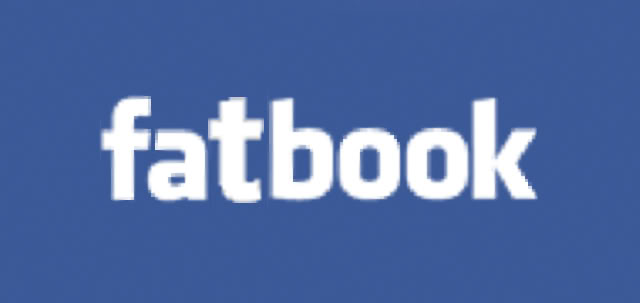


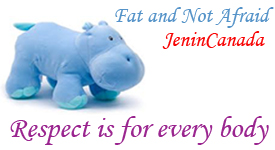

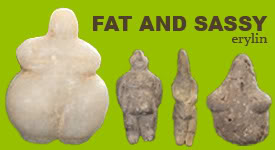
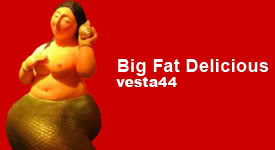




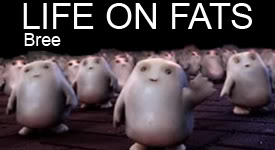
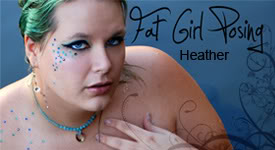


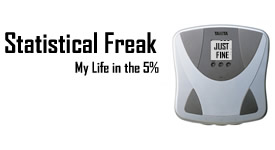
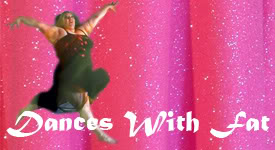

Fucking Canada. You guys get everything cool.
When we moved about two years back we got a shed in the backyard that wasn’t bolted down and we didn’t discover as much until the first bad storm.
America fucking sucks when it comes to health care information. I’m curious how much of that report is influenced by the work of Dr. Sharma. It seems like he’s pretty adamant about the no dieting philosophy, so it seems likely that his message is making an impact in your neck of the woods.
By the way, congratulations on the move. Bet you’re happy for it to be over. Now for the unpacking phase, which we still haven’t completed.
Great to have you back, Jen.
Peace,
Shannon
We have Stephen Harper though…
I love the BC Health Guide! I have found it very helpful with a very wide range of issues. Also, the BC Nurse Line is pretty helpful - the number should be in the book - if you are ever in a situation if you’re not sure if you need to go to Emergency for something.
And welcome to the We(s)t Coast, Jen!
Thanks, Calantheliadon! Where abouts are you? In Ontario we had the Telehealth Nurse Line, which was similar.
My roomate points out that in the BC HealthGuide, in the front part where it`s talking about healthy lifestyle, it does have a BMI chart, countered immediately by “What is a healthy weight?”
That book is certainly above and beyond anything I ever imagined! Here in the U.S. these days they pretty well hand you a shovel and tell you to dig your own grave. I’m being a bit facetious, but our health care system is a rather scary joke at this time. We have wonderful technology to save lives but a person could end up homeless if they have a health problem. Good times!
Check out this .pdf from the Toronto Health department: “Helping Children to Be Active,
Eat Well and Accept their Bodies” http://www.toronto.ca/health/pdf/nm_helping_children.pdf This is amazing!
Now that’s what Michelle Obama should have done for her “Let’s Move” campaign instead of her “eradicate childhood obesity in a generation”. But that would make too much sense and wouldn’t be aesthetically pleasing to the media who have jumped onto the diet industry’s OMGOBESITYEPIPANIC bandwagon (nor would the majority of fat-phobes like it either).